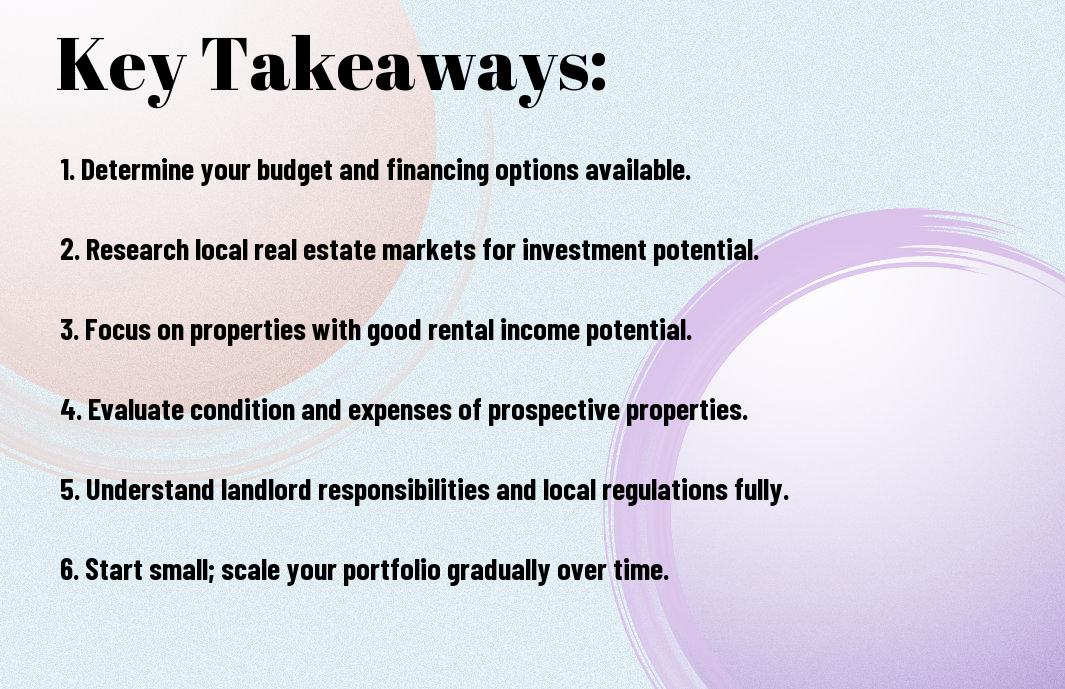Many first-time investors find the idea of buying a rental property intimidating, but with the right knowledge and approach, you can turn this venture into a rewarding source of income. Understanding the key steps involved will empower you to make informed decisions as you navigate the real estate market. From setting a budget and securing financing to choosing the right property and managing tenants, this guide will equip you with the important tools to help you successfully purchase your first rental property.
Key Takeaways:
- Research the Market: Understanding local property values, trends, and rental demand is necessary for making an informed purchase.
- Financing Options: Explore various financing options, including traditional mortgages, FHA loans, or private lenders, to secure the best rates and terms for your investment.
- Property Management: Decide whether to manage the property yourself or hire a professional property management company to handle tenant relations and maintenance.

Understanding the Rental Property Market
Before exploring into your first rental property purchase, it’s necessary to grasp the rental property market’s dynamics. Analyzing market trends, local demand, and economic indicators allows you to make informed decisions. Understanding how external factors, such as employment rates and population growth, affect rental prices will help you identify lucrative opportunities. The more you comprehend the market landscape, the better prepared you’ll be to maximize your investment potential.
Market Research Techniques
Against common misconceptions, market research can be straightforward and immensely beneficial. Begin by utilizing online resources such as real estate platforms and local property listings. Networking with real estate agents, attending property expos, and joining community forums can also provide insider knowledge regarding neighborhood trends and emerging markets. Such research will give you a solid foundation to evaluate possible investments effectively.
Key Indicators to Consider
Any reliable investment approach should assess key indicators that reflect the rental market’s health. These indicators include average rental prices, vacancy rates, and demographic shifts. Evaluating these factors helps you understand the demand for rental properties and the potential for long-term appreciation.
Market trends serve as a window into the economic backdrop affecting your potential investment. A rising average rental price indicates strong demand, while high vacancy rates may suggest an oversaturated market. Additionally, demographic changes, such as population growth or influx of young professionals, can signal a thriving rental environment. By keeping an eye on these key indicators, you’re better equipped to choose properties with the best potential for profitability and value appreciation.
Financing Your First Rental Property
There’s a variety of financing options available to help you purchase your first rental property. You need to assess your financial situation and select the best option that aligns with your investment strategy. Traditional mortgages are commonly used, but alternative financing solutions may offer flexibility and lower barriers to entry. Understanding these options is vital for your success in the rental market.
Traditional Mortgages vs. Alternative Financing
Among the most popular options, traditional mortgages are great if you have a good credit score and a solid down payment. However, alternative financing methods like seller financing, hard money loans, or partnerships can be effective if you face challenges with the conventional route. Each has its own pros and cons that you should weigh carefully based on your individual circumstances.
Understanding Loan Terms and Interest Rates
Around the time you start exploring financing, it’s imperative to familiarize yourself with loan terms and the impact of interest rates on your investment. A small difference in rate can significantly affect your monthly payments and overall returns. Knowing how to navigate these factors can lead to better financial decisions for your rental property.
Terms, such as the length of the loan and amortization schedule, will dictate how much you pay each month and the total interest paid over the life of the loan. Interest rates, whether fixed or variable, directly impact your payment amount. A fixed-rate mortgage provides stability, while a variable rate may start lower but can increase unpredictably. Analyzing your budget and investment strategy will help you make informed choices that suit your long-term goals.
Choosing the Right Property
Not selecting the right property can lead to unnecessary headaches and financial strain. To avoid this, consider how to buy your first rental property in 2023: 5 simple steps. Focus on factors such as property type, potential returns, and location to make an informed decision that aligns with your investment goals.
Types of Rental Properties
Between single-family homes, condos, multi-family units, and vacation rentals, the choice can be overwhelming. Each type offers different advantages:
- Single-family homes – often easier to manage and have wider market appeal.
- Condos – typically lower maintenance but may have association fees.
- Multi-family units – can generate higher income streams but require greater management effort.
- Vacation rentals – can be lucrative in tourist areas but depend on seasonal occupancy.
Perceiving these types through a strategic lens can help you identify the best fit for your investment strategy.
| Property Type | Description |
|---|---|
| Single-Family Home | Standalone dwellings, favored for their market appeal. |
| Condominium | Shared properties, often with fewer maintenance requirements. |
| Multi-Family Unit | Buildings with multiple rental units, great for cash flow. |
| Vacation Rental | Properties rented for short-term stays, ideal in travel hotspots. |
| Commercial Property | Buildings rented to businesses, can provide long-term growth. |
Assessing Location and Neighborhood Amenities
Above all, the location and amenities greatly influence rental property success. Look for properties in neighborhoods with good schools, low crime rates, and access to public transport and shopping amenities, as these elements enhance desirability. Consider proximity to parks, restaurants, and entertainment options as well, as they contribute to higher rental demand.
The importance of location cannot be overstated, as it significantly impacts your investment’s long-term value and rental income potential. Take the time to research local market trends and evaluate neighborhood stability. Engage with community members and check local crime statistics to gauge the area’s livability. By focusing on these factors, you can ensure that your investment will attract quality tenants and retain its value over time.

Evaluating Potential Rental Income
For assessing the viability of a rental property, you need to evaluate its potential rental income. This involves researching comparable properties in the area to establish what you can realistically charge tenants. Look for local market trends and consider factors that affect rental prices, such as location, property condition, and amenities. By accurately estimating rental income, you can better determine if the investment aligns with your financial goals.
Calculating Cash Flow
For a successful rental investment, calculating cash flow is vital. Cash flow is the difference between your rental income and all operating expenses. To find your monthly cash flow, subtract costs such as mortgage payments, property management fees, and maintenance expenses from your rental income. Ensuring a positive cash flow will help you sustain your investment and provide ongoing income.
Understanding Operating Expenses
Above all, understanding operating expenses is vital for creating a realistic budget for your rental property. Operating expenses encompass all recurring costs necessary to maintain the property and generate rental income. This includes property taxes, insurance, maintenance and repair costs, and property management fees. By accurately accounting for these costs, you can ensure a more credible assessment of your potential property’s profitability.
Another key aspect of understanding operating expenses involves accounting for any unexpected costs that may arise over time. Properties may require fundamental repairs or unexpected maintenance, affecting your overall cash flow. It’s wise to set aside a reserve for capital expenditures, like roof replacements or appliance upgrades, ensuring that you can cover these expenses without straining your finances. Taking a proactive approach to your operating expenses can help you manage your investment effectively and maintain positive cash flow.
Legal Considerations and Responsibilities
Many aspiring landlords overlook the importance of understanding the legal landscape surrounding rental properties. Compliance with local laws, zoning regulations, and property taxes is important for ensuring a smooth rental experience. Familiarize yourself with fair housing regulations and consult resources on How Do You Buy Your First Investment Property? to ensure you’re well-informed throughout the purchasing process.
Lease Agreements and Tenant Rights
Against the backdrop of landlord-tenant relationships, lease agreements serve as the foundation of your rental business. Clearly outlining terms, rights, and obligations protects both you and your tenants, fostering a respectful and lawful rental experience.
Property Management Options
Below the complexities of managing a rental property lies a range of property management options available to you. You can choose to self-manage or hire a professional management company depending on your expertise and availability.
In addition, using a property management company can relieve you from the more tedious aspects of property maintenance, tenant screening, and rent collection. Hiring professionals allows you to focus on other investments while ensuring your property is well-maintained and your tenants are supported. Assess your budget and priorities before deciding if this is the right route for your rental journey.
Making the Purchase
After you’ve done your research and narrowed down your options, it’s time to make the purchase. This step involves making an offer on a property you want to buy. You’ll need to conduct a thorough inspection and secure financing to ensure you are well-prepared. A well-structured offer can help you stand out in a competitive market. As you approach this stage, make sure to remain flexible and open to negotiations, as they are a natural part of the buying process.
Working with Real Estate Agents
Against the common belief that you can go it alone, partnering with a good real estate agent is invaluable. They can provide you with market insights and access to listings that you may not find on your own. Their expertise can also save you time and money throughout the buying process, as they help you navigate paperwork and communicate with sellers effectively.
Negotiation Strategies
Behind every successful real estate purchase lies effective negotiation strategies. You must be assertive yet reasonable to secure the best deal. Research the market value of similar properties to give you leverage in discussions. Be prepared to walk away if the terms do not meet your needs, which shows the seller you are serious about making a smart investment.
And to strengthen your negotiation position, keep your emotions in check and focus on your goals. Understand the seller’s motivations—knowing why they are selling can guide your approach. Presenting a pre-approval letter can also add weight to your offer. Don’t hesitate to ask for seller concessions, such as closing cost assistance, to further enhance your deal. Building rapport with the seller may also encourage flexibility in negotiations and lead to a more favorable outcome for you.
Summing up
Summing up, purchasing your first rental property can be a rewarding investment journey when approached methodically. Start by thoroughly researching the market and determining your budget, including financing options. Inspect potential properties, considering location and rental demand, and run the numbers to ensure profitability. Engage professionals like real estate agents and property managers to streamline the process. Once you’ve made your purchase, keep a close eye on maintenance and tenant relations to maximize your investment. With diligence and informed decisions, you can build a successful rental portfolio over time.
Q: What steps should I take to start the process of buying my first rental property?
A: The first step in purchasing your first rental property is to assess your financial situation. Ensure you have a good credit score and understand your budget, including how much you can comfortably borrow. Next, research the real estate market in your desired area to find potential properties. It’s advisable to get pre-approved for a mortgage to streamline the buying process. After that, work with a knowledgeable real estate agent who specializes in investment properties. Start viewing properties and assess their features, location, and rental potential, and finally make an offer on a property that meets your criteria.
Q: How do I determine if a rental property is a good investment?
A: To evaluate if a rental property is a good investment, analyze the potential rental income compared to the property’s expenses. Calculate the expected cash flow by subtracting all operating costs from the rental income. Additionally, consider the property’s location, condition, and proximity to amenities, as these factors can significantly affect its desirability and occupancy rate. Investigating the local rental market to understand average rents and demand can help you make an informed decision. Lastly, consider long-term appreciation possibilities in the area to maximize your investment.
Q: What financing options are available for purchasing my first rental property?
A: There are several financing options to consider when purchasing your first rental property. Traditional mortgages are popular, requiring a down payment, typically ranging from 20% for investment properties. Additionally, you may look into FHA loans, which can be a good option for first-time buyers seeking lower down payments, though they also come with specific requirements and limits. Some buyers opt for private lenders or hard money loans, which can be more accessible but often come with higher interest rates. Lastly, consider partnering with other investors to pool resources and share the financial responsibilities.
